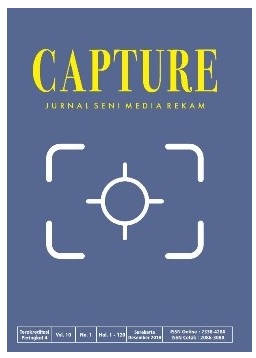SEXY KILLERS : FILM AND ENVIRONMENTAL MOVEMENT
DOI:
https://doi.org/10.33153/capture.v12i1.3209Keywords:
Sexy Killer, documenter film, environmental movementAbstract
This study focuses on how a documentary film entitled Sexy Killers can be part of the campaign for change. This film with the issue of environmental damage is interesting to study about the reading of the text by the audience as an active producer of meaning. In order to understand how the audience read the text, a Sexy Killers research was conducted using a Descriptive Qualitative approach. The data collection technique used Purposive Sampling with In-Depth Interviews, then the data were processed by Content Analysis. The results of this study indicate that there are different perspectives in reading this film, which can be categorized into anthropocentrism, biocentrism and eco-centrism. This differences in reading are influenced by differences in educational backgrounds, professions, and also interests. Film as a text, is not a unit, but rather a kind of battlefield to compete to accept, reject, or negotiate certain ideas. Understanding the results of this reading can be useful for determining the right steps in encouraging the environmental conservation movement
Downloads
References
Adorno, T. W., & Horkheimer, M. (2002). Dialectic of Enlightenment. California: Stanford University Press.
Alfia Abdullah, S. N. (2020). Analisis Semiotika Julia Kristeva dalam Film “Sexy Killers” (Pendekatan Semanalisis hingga Intertekstualitas). Al-Wardah, 13(2), 255–279. doi: http://dx.doi.org/10.46339/al-wardah.v13i2.216
Andits, P. (2013). Movies and Movements. Retrieved from https://onlinelibrary.wiley.com/doi/abs/10.1002/9780470674871.wbespm137
Araiemei. (2019). Opini Menganalisis Respon Film Sexy Killers [Blog]. Retrieved from Rimaginary website: https://rimaraiemei.wordpress.com/
Brulle, R. J. (2008). The U.S. Environmental Movement. In 20 Lessons in Environmental Sociology. Roxbury Press.
Eka Putri, N. W. (2019). Semiotika Pierce pada Film Dokumenter ‘Sexy Killers’’.’ Maha Widya Duta, 3(2), 89–100.
Fahriansyah, E., Sasongko, H., & Krishna, A. (2018). Gadang House in Documentary Film of the Adat Nagari Sijunjung District. CAPTURE : Jurnal Seni Media Rekam, 10(1), 78–90. doi: 10.33153/capture.v10i1.2244
Hall, S. (1980). Encoding/decoding. In Culture, Media, Language: Working Papers in Cultural Studies, 1972-79. London: University of Birmingham.
Keraf, A. S. (2010). Etika Lingkungan Hidup. Jakarta: Kompas.
Knudson, T. (2001). Environment Inc. Retrieved from The Sacramento Bee website: https://www.sacbee.com/
Kotler, P. (1989). Manajemen Pemasaran: Analisis, Perencanaan dan Pengendalian. Jakarta: Salemba Empat.
Laksono, D. (2013). WatchDoC Tak Sekedar Art, Tetapi sebagai Social Movement [Suluh Pergerakan]. Retrieved from https://suluhpergerakan.org/dandhy-laksono-watchdoc-tak-sekedar-art-tetapi-sebagai-social-movement/
McQuail, D. (2008). Mass Communication Theory. Jakarta: Erlangga.
Murdiyanto, M. S. (2019). Makna Oligarki dalam Film Sexy Killers Karya Dandhy Dwi Laksono (Studi Kualitatif Menggunakan Analisis Semiotika Roland Barthes Mengenai Oligarki) (Universitas Pasundan). Universitas Pasundan. Retrieved from http://repository.unpas.ac.id/46197/
Murfianti, F. (2012). Read the Madura Ethnic Identity on “Semesta Mendukung". Presented at the International Conference on Media Communication and Culture, Yogyakarta.
Pertiwi, H. F. (2020). Analisis Corporate Citizenship Dan Hak Asasi Manusia Terhadap Isu Eksploitasi Lingkungan Pada Film “Sexy Killers.” Masalah-Masalah Hukum, 49(1), 71–79. doi: 10.14710/mmh.49.1.2020.71-79
Potash, S. (2011). Movie to Movement: Creating Social Change with the Documentary Film ’Food Stamped’ (The University of New Mexico). The University of New Mexico, New Mexico. Retrieved from https://digitalrepository.unm.edu/cgi/viewcontent.cgi?article=1061&context=educ_hess_etds
Ruslan, R. (2008). Manajemen Public Relations & Media Komunikasi. Jakarta: PT. Rajagrafindo Persada.
Stewart, C. J., Smith, C. A., & Denton, R. A. (2007). Persuasion and Social Movements (5th ed.). Waveland Press.
Stover III, J. A. (2013). Framing Social Movements through Documentary Films. Contexts (SAGE Journals), 12(4), 56–58. doi: https://doi.org/10.1177/1536504213511218
Suryanto, H., & Amri, M. (2018). Film as Cultural Diplomation Assets. CAPTURE : Jurnal Seni Media Rekam, 9(2), 47–55. doi: 10.33153/capture.v9i2.2089
Turner, G. (2006). Film as Social Practice (4th ed.). London: Routledge.
Downloads
Published
Issue
Section
License
Copyright (c) 2020 Fitri Murfianti

This work is licensed under a Creative Commons Attribution-ShareAlike 4.0 International License.
Copyright
Authors who publish with Capture: Jurnal Seni Media Rekam agree to the following terms:
- Authors retain copyright and grant the journal right of first publication with the work simultaneously licensed under a Creative Commons Attribution License (CC BY-SA 4.0) that allows others to share the work with an acknowledgment of the work's authorship and initial publication in this journal.
- Authors are able to enter into separate, additional contractual arrangements for the non-exclusive distribution of the journal's published version of the work (e.g., post it to an institutional repository or publish it in a book), with an acknowledgment of its initial publication in this journal.







